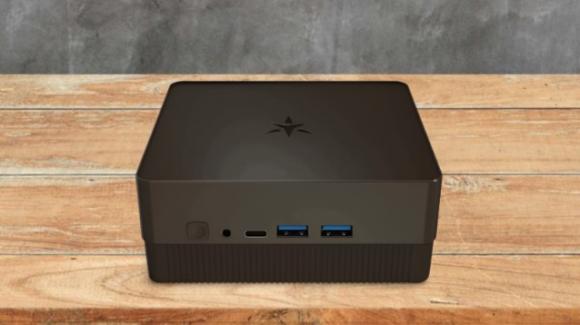After a long absence, the British Star Labs returns to show up and, this time, it declines its passion for the Linux world with a miniPC, fielding the new compact computer, in AMD sauce, Byte Mk I.
After a long series of notebooks animated by Linux-based operating systems (culminating with the Star LabTop and Star Lite), the British Star Labs, always in the name of free and open software (FOSS), has announced a Linux-based miniPC, the Byte Mk I model, totally based on the processing hardware expertise of the AMD chipmaker.
Byte Mk I has a classic box shape, with the lower part aesthetically serrated and the roof with the iconic logo of the brand: along the perimeter, there are the many doors, flagship of this device, formed by a reader of microSD, from an RJ45 port for Gigabit Ethernet, from a USB Type-C (for expandability and power supply), from two HDMI to connect two screens, to which are added a poker of USB Type-A, solomonically divided between 2.0 and 3.0 (two per generation).
The interior, during the configuration phase of the Byte Mk I miniPC, offers only a logical structure: in particular, the user will have to make use of the octacore processor (from 1.9 to 4.4 GHz in Turbo) with sixteen threads AMD Ryzen 7 5800U, from Cezanne generation, with Zen 3 microarchitecture, built (by TMSC) with 7 nanometers of lithography, which ensures low consumption (the TDP, even if set by default at 15 watts, and can be increased to 25, can be reduced up to 10W). The graphics card is always the integrated Radeon RX Vega 8, with 8 core units of 2,000 MHz maximum.
Due to this choice, the supported RAM, with high energy efficiency, is the DDR4-3200 (and not the LPDDR4-4266): the user will have discretion in establishing the amount, with an expansion up to 64 GB. The storage, SSD, can be expanded up to a total of 6 TB. In terms of software, it will be possible to choose, in firmware share, between the proprietary and closed solution (Aptio V) of American Megatrends, and the open one, Coreboot (a sort of “free” Bios) supported by the Free Software Foundation.
The operating system will always be a pre-installed version of Linux, chosen from a classic release such as Ubuntu 20.04.3 LTS, or a spin-off of it (Kubuntu, Ubuntu MATE, Xubuntu, Linux Mint 20.3 with Xfce / KDE Plasma / GNOME graphic environment ), without neglecting, among the various options, Manjaro Linux 21.0, MX Linux, and those that simulate Windows, such as Zorin OS 16.1 (in the Lite, Core, Pro levels) or elementary OS 6.1.

